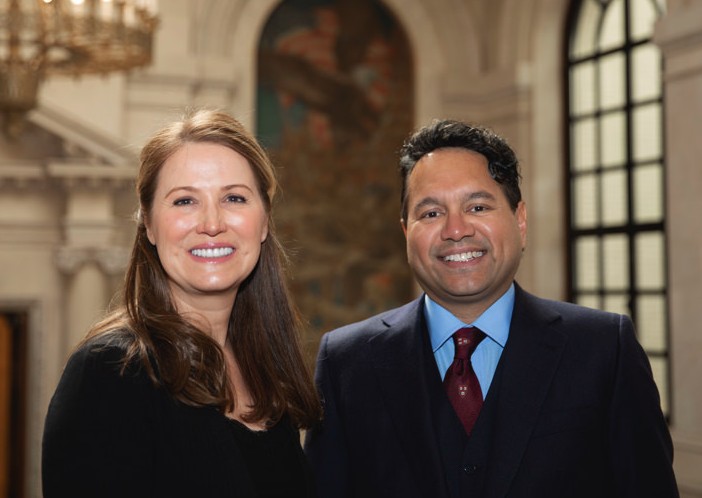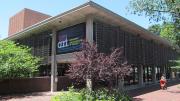The Harvard-affiliated American Repertory Theater (ART), now based in the Loeb Drama Center, which opened on Brattle Street in Cambridge in 1960, will relocate to a new home in Allston—a move catalyzed by a $100-million gift from David E. Goel ’93 and Stacey L. Goel, the University announced today. Important details—the exact site, timing of the planned move, and architectural or design features of the new theater facility—remain to be determined; the announcement noted that the ART would continue to present performances at the Loeb “for several years while plans develop.”
All this suggests that the plan and the gift are of relatively recent vintage, and that further work remains to effect the move as Harvard “continue[s] to assess its design, fundraising, and planning needs in the coming months” before proceeding. Typically, such a project would also need to undergo regulatory review by Boston officials. The fact that the announcement made no mention of naming the new facility (see “An Interest in the Arts,” below) is perhaps the clearest sign that further support is still being sought.
The University announcement put the ART facility in the context of a “state-of-the-art research and performance center.” Noting its prospective location in Allston—where the engineering and applied sciences complex is now under construction on Western Avenue—David Goel made this statement about the project in the news release:
There is something almost metaphorically perfect about the architectural license to build a center for the arts at the nucleus of Harvard’s expanding campus, a physical representation of the idea that each set of academic disciplines is strengthened by proximity, dialogue, and contribution to the same tapestry of human understanding.
He further endorsed the notion of “a versatile theater space that can be reshaped as appropriate to express and share the abundant ideas originated by the College, the American Repertory Theater, and Harvard’s community already at home in Allston—and connect them through music, dance, theater, debate, lectures, conferences, and dialogue in any format.”

David E. Goel and Stacey L. Goel
Photograph by Kris Snibbe/Harvard Public Affairs & Communications
On a personal note, the Goels said their gift is intended to honor David’s parents, “whose love, mentorship, and sacrifice” made his education possible.
President Lawrence S. Bacow said:
David and Stacey have given us a gift that will undoubtedly inspire support for one of our most exciting projects to advance the arts at Harvard. The ART is a magnet for extraordinarily talented individuals who change the way we understand the world through live theater. It has thrived under the leadership of [artistic director] Diane Paulus, and the new space we envision will be a magnet for artists and audiences, as well as students, faculty, and staff. Allston will be home to one of the nation’s great incubators of creativity. We are so grateful to the Goels for their commitment to nurturing and connecting knowledge through one of humanity’s most enduring mediums.
Making Sense of Surprising News
The news contains multiple surprises:
- President Bacow has talked about making Harvard’s Allston development a rounded, complete community, but no prior planning has incorporated a full relocation of the ART.
- Earlier arts-related plans near the intersection of Western Avenue and North Harvard Street—a new art museum (perhaps focused on modern and contemporary works, which can require large gallery spaces) or a mixed performing-arts venue—have not been pursued.
- And although the Goels are substantial philanthropists with a strong interest in the arts, they have not previously appeared as major Harvard donors.
On the other hand, the University has already made two investments in arts-related facilities in Allston. The Harvard Ed Portal, part of the community benefits accompanying Boston approval of the University’s master plan for Allston development late in the prior decade, is now housed in a new facility at 224 Western Avenue; it operates a substantial community arts program and houses the ceramics studio. And the University’s art-maker space, the ArtLab, earlier this week announced its leadership and soft opening nearby, on North Harvard Street.
Were the ART to be sited in the vicinity, Harvard’s central arts presence in Allston would expand exponentially. Today’s announcement alludes to the new arts center “adjacent to the athletic facilities on North Harvard Street.” One site for a new theater might be just across the street from the ArtLab: the existing low-rise buildings and parking lot at 175 North Harvard Street, just north of the Continuum residential and retail complex developed on Harvard land, were originally identified in the 2012 University master plan as a likely site for a new basketball arena (a plan subsequently superseded by the renovation of Lavietes Pavilion) and a mixed-use structure that might accommodate graduate-student housing. Or there could be space south of the ArtLab, on a North Harvard Street site already approved for an office or mixed-use building. (Although Bacow has also established a new organization to coordinate and accelerate Allston development, its mission encompasses the commercial investments contemplated along Western Avenue, closer to the Charles River, among which a nonprofit theater would seem out of place.)
A new ART facility in Allston also solves other problems:
- The ART is understood to have been seeking support for a substantial renovation of the Loeb facility. That complex, designed by Hugh Stubbins, M.Arch. ’68, was in fact built before the ART arrived as a professional theater company in 1980. Now, after decades of continuous use, it is worn, and presents challenges for accessibility and for retrofitting with modern performance technology and backstage space and facilities. Any such overhaul would likely entail substantial investment (money for renovations is not always easy to raise)—and disruptions to the seasonal performance schedule. The prospect of a brand-new performing-arts complex should certainly be a strong encouragement to keep artistic director Paulus in the fold.
- Moreover, the Goels’ gift will apparently in part provide funds to reposition the Loeb Drama Center for the Faculty of Arts and Sciences (FAS) and, according to the announcement, “new University uses.” That would help accomplish a couple of goals. First, the relationship between the ART and FAS’s teaching mission and extracurricular performances has never been entirely clear or comfortable. Although the Harvard-Radcliffe Dramatic Club uses the Loeb’s stages, the professional company’s demands are significant. A refreshed Loeb facility would provide performing and arts-teaching space at a time of expanding investment in the undergraduate arts curriculum (for example, the concentration in Theater, Dance, and Media; refitting part of the former Sackler museum for studios and art-making space, The Annex; and the pending renaming of visual and environmental studies as the department of art, film, and visual studies). It also, presumably, becomes available as another large auditorium adaptable for lectures, screenings, or other purposes, easing the demands on Sanders Theatre. According to the news release, the Goels are helping to support FAS dean Claudine Gay’s plans for investment in students’ “creative passions,” including assessing “increased need for teaching, rehearsal, and performance spaces.” In the announcement, she thanked the Goels for their “extraordinary level of support for the arts at Harvard, especially coming at a time when faculty and student demand is driving growth of our programs across the board.”
Today’s announcement clearly intends to “[kick] off the University’s effort to fund” the new Allston facility and associated arts programs. Bacow has repeatedly stressed the importance of securing funding, in full, both to build new facilities or initiate new programs, and to endow their continued operation. So the news about this lead act of philanthropy suggests further solicitations are under way, with subsequent gift announcements to be expected. The Goels’ decision to become significant donors to Harvard (see below) itself sends a signal about a widening cohort of supporters—including from a new generation, like the anonymous 1990s College graduate who recently gave $100 million to underwrite science education and other priorities within FAS. (Including the $200-million gift for medical research disclosed last November, this is the third nine-figure gift Bacow has been able to celebrate since becoming president last July 1—the day after the formal conclusion of the $9.6-billion Harvard Campaign.)
It could not be determined whether this announcement is tied to wider plans for Harvard’s academic and other aspirations elsewhere on its Allston landholdings.
The reaction in Harvard’s host communities will be interesting. Cambridge may well be disappointed to lose a marquee arts attraction—and the associated dining business and street life along Brattle and nearby. No announcement was made about the ART’s Oberon stage and nightlife venue at 2 Arrow Street.
Across the Charles, of course, the arrival of a nationally known theater extends Boston’s reach as New England’s art capital. The announcement contains this statement from Boston mayor Martin J. Walsh:
David and Stacey Goel’s generous gift presents Boston's artists of all ages an opportunity to collaborate and learn alongside world-renowned talent in their own neighborhood. I am grateful for the opportunities that have developed through the city’s partnership with Harvard University and look forward to seeing how the ART will be able to build on our relationship in Allston and beyond in new creative ways.
The fundraisers for the region’s other top-ranked repertory operation, the Huntington Theatre Company (HSC)—formerly associated with Boston University—are engaged in a five-year capital campaign (for a reported $70 million) aimed at securing resources to upgrade and expand their facilities in concert with a huge commercial redevelopment of the site, near Boston’s Symphony Hall. The HSC assumed full ownership of the former Boston University Theatre in May 2018. They may be equally jealous of and inspired by the ART’s $100-million good fortune.
An Interest in the Arts
In the 1993 yearbook, David Goel, a government concentrator, listed his College activities as the Business Club (prescient), the Canadian Club (his original citizenship and domicile at the time), the Pre-Law Society, and the Speech and Parliamentary Debate Society. He did not include any artistic or performing pursuits—but he was a resident of Adams House, and so perhaps imbibed some of its creative-arts vibe. He co-founded Matrix Capital Management Company LP, a hedge fund, in 1999, after previous experience in investment banking and at private investment-management enterprises, and has continued to lead it as managing general partner.
He and Stacey Goel have been active in support and on the leadership boards of diverse institutions, often with substantial investments in the arts, including:
- Museum of Fine Arts, Boston (David has served as a trustee since 2010, and a gallery bears their name);
- Phillips Exeter Academy (he is an 1989 graduate and served on the leadership committee for the $305-million Exeter Initiatives campaign—and the 63,000-square-foot David E. and Stacey L. Goel Center for Theater and Dance, designed by Tod Williams and Billie Tsien, was dedicated last October 27); and
- Winsor School, Boston (David is a trustee and assistant treasurer, and both Goels are members of the larger Winsor Corporation; they are parents of a class of 2023 student, and the school’s theater was named in their honor in recognition of a capstone gift during the $80-million Promise campaign, which concluded in 2016. Interestingly, Joseph J. O’Donnell ’67, M.B.A. ’71, a former Harvard Corporation member—and formidable University fundraiser—is a fellow Winsor trustee and Corporation member; David Goel cited him as a mentor in a Winsor interview.)
That interest in culture, the arts, education, and their intersection obviously reached a new height, on Harvard’s behalf, in today’s announcement.









